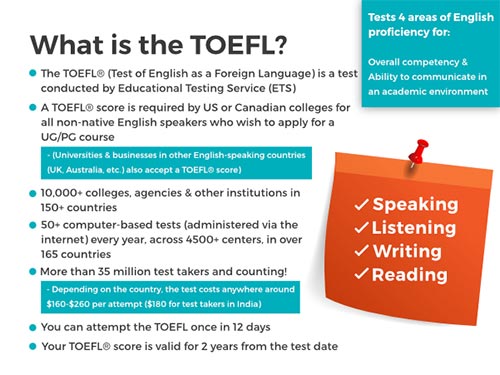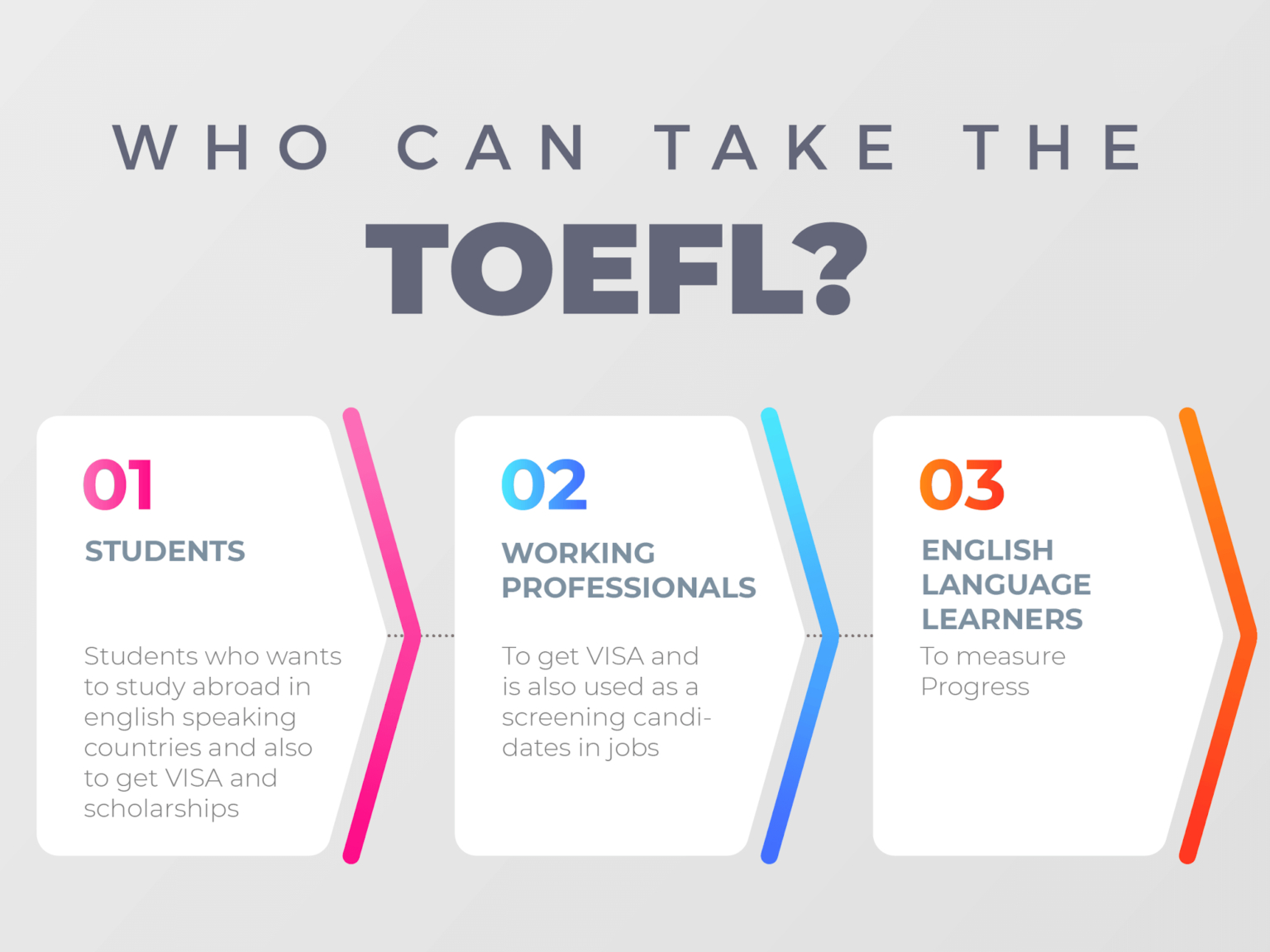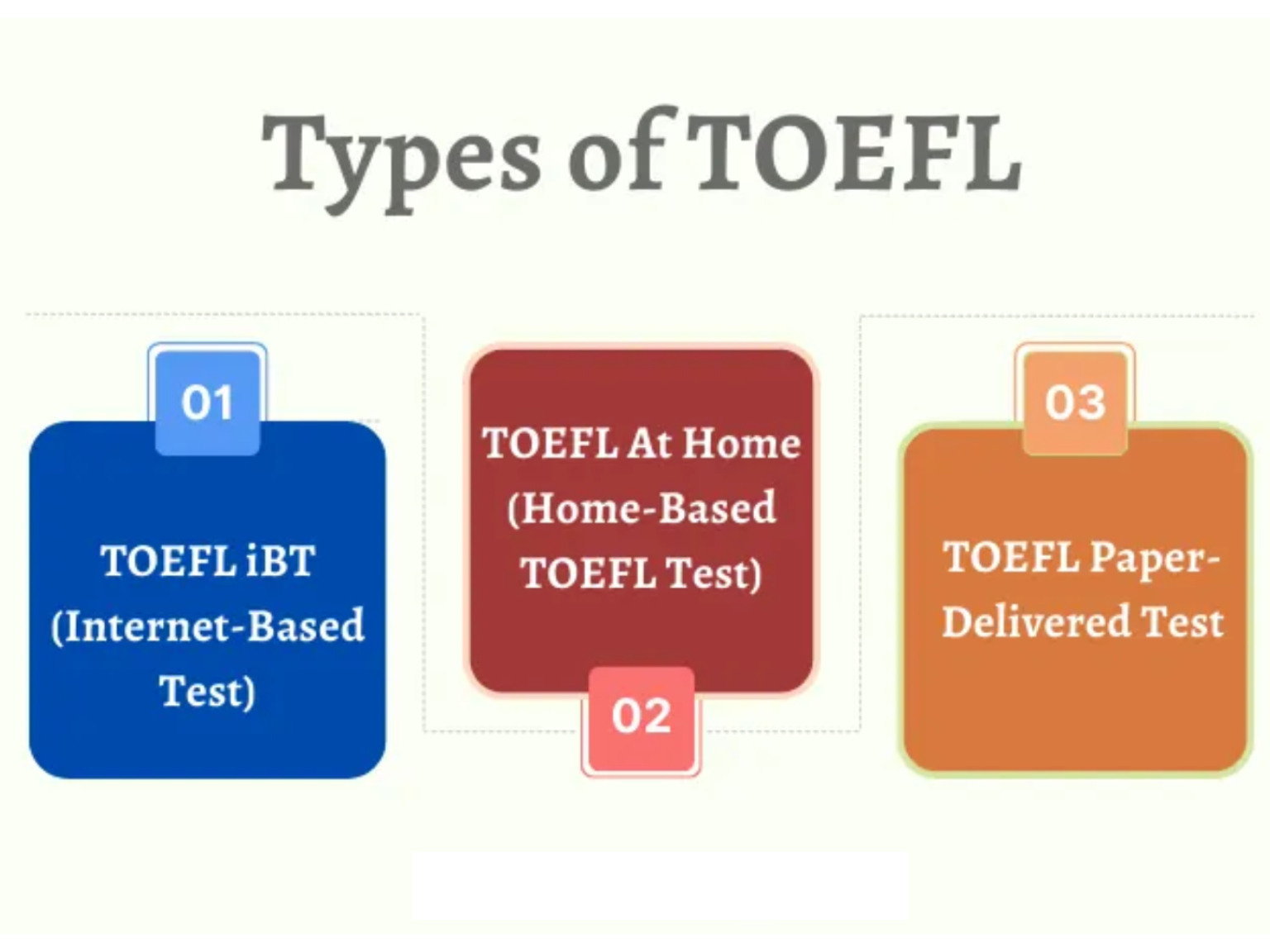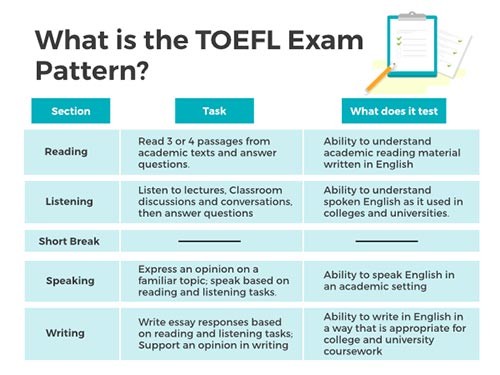The TOEFL, or Test of English as a Foreign Language, is a standardized test widely used to assess English language proficiency for non-native English speakers. Here are some key details:
Sections: The test consists of four sections: Reading, Listening, Speaking, and Writing.
Scoring: Each section is scored separately, and the total score is on a scale of 0 to 120. The individual sections are scored on a scale of 0 to 30.
Duration: The total test time is approximately four hours.
Internet-based Test (iBT): TOEFL is primarily conducted as an iBT. It replaced the paper-based test and is administered online.
Test Dates: TOEFL is offered on specific dates throughout the year, and you can register for a test date that suits your schedule.
Validity: TOEFL scores are valid for two years.
Purpose: TOEFL scores are often used by universities and colleges as part of the admissions process for English-speaking programs.
Test of English as a Foreign Language is a standardized test to measure the English language ability of non-native speakers wishing to enroll in English-speaking universities. The test is accepted by more than 11,000 universities and other institutions in over 190 countries and territories. TOEFL is one of several major English-language tests worldwide, including IELTS, Duolingo English Test, Cambridge Assessment English, and Trinity College London exams.
TOEFL is a trademark of the Educational Testing Service (ETS), a private non-profit organization, which designs and administers the tests. ETS issues official score reports which are sent independently to institutions and are valid for two years following the test.



The TOEFL Internet-based test (iBT) measures all four academic English skills: reading, listening, speaking, and writing.
Reading
The Reading section consists of questions on 3–4 passages, each approximately 700 words in length and with 10 questions. The passages are on academic topics; they are the kind of material that might be found in an undergraduate university textbook. Passages require an understanding of rhetorical functions such as cause-effect, compare-contrast, and argumentation. Students answer questions about main ideas, details, inferences, essential information, sentence insertion, vocabulary, rhetorical purpose, and overall ideas. New types of questions in the TOEFL iBT test require filling out tables or completing summaries. Prior knowledge of the subject under discussion is not necessary to come to the correct answer.
Listening
The Listening section consists of questions on 2–3 conversations with 5 questions each and 3–4 lectures with 6 questions each. Each conversation is 2.5–3 minutes and lectures are 4.5–5.5 minutes in length. The conversations involve a student and either a professor or a campus service provider. The lectures are a self-contained portion of an academic lecture, which may involve student participation and do not assume specialized background knowledge in the subject area. Each conversation and lecture passage is heard only once. Test-takers may take notes while they listen and they may refer to their notes when they answer the questions. The listening questions are meant to measure the ability to understand main ideas, important details, implications, relationships between ideas, organization of information, speaker purpose, and speaker attitude.
Speaking
The Speaking section consists of 4 tasks: 1 independent (Task 1) and 3 integrated (Task 2, 3, 4). In task 1, test-takers answer opinion questions on familiar topics. They are evaluated on their ability to speak spontaneously and convey their ideas clearly and coherently. In tasks 2 and 4, test-takers read a short passage, listen to an academic course lecture or a conversation about campus life, and answer a question by combining appropriate information from the text and the talk. In task 3, test-takers listen to an academic course lecture and then respond to a question about what they heard. In the integrated tasks, test-takers are evaluated on their ability to appropriately synthesize and effectively convey information from the reading and listening material. Test-takers may take notes as they read and listen and may use their notes to help prepare their responses. Test-takers are given a short preparation time before they have to begin speaking. The responses are digitally recorded, sent to ETS's Online Scoring Network (OSN), and evaluated by three to six raters
Writing
The Writing section measures a test taker's ability to write in an academic setting and consists of two tasks: one integrated and one independent. In the integrated task, test-takers read a passage on an academic topic and then listen to a speaker discuss it. The test-taker then writes a summary of the important points in the listening passage and explains how these relate to the key points of the reading passage. In the independent task, the test-taker must write an essay that states their opinion or choice, and then explain it, rather than simply listing personal preferences or choices. Responses are sent to the ETS OSN and evaluated by at least 3 different raters.
| Task | Description | Approximate time |
|---|---|---|
| Reading | 3–4 passages, each containing 10 questions | 54–72 minutes |
| Listening | 5–7 passages, each containing 5–6 questions | 41–57 minutes |
| Break | Mandatory break | 10 minutes |
| Speaking | 4 tasks | 17 minutes |
| Writing | 2 tasks | 50 minutes |
The TOEFL Paper-delivered Test is an official test for use where the internet test is unavailable, usually due to internet & computer issues.
It consists of the Listening, Reading, and Writing sections, with scores that are on the same scale as the Internet-Based Test. There is no total score. Not all centers have the possibility of delivering this type of test, so it will generally be necessary to reschedule the day of the test for another available day.
The TOEFL paper-based Test (PBT) was still available in limited areas until 2017 when it was replaced by the Paper-delivered test. Scores are valid for two years after the test date, and test takers can have their scores sent to institutions or face time.
Listening (30 – 40 minutes)
The Listening section consists of 3 parts. The first one contains 30 questions about short conversations. The second part has 8 questions about longer conversations. The last part asks 12 questions about lectures or talks. Harder questions are worth two scores.
Structure and Written Expression (25 minutes)
The Structure and Written Expression section has 15 exercises for completing sentences correctly and 25 exercises for identifying errors. Harder questions are worth two scores.
Reading Comprehension (55 minutes)
The Reading Comprehension section has 50 questions about reading passages. Harder questions are worth two scores.
Writing (30 minutes)
The TOEFL PBT administrations include a writing test called the Test of Written English (TWE). This is one essay question with 250–300 words on average.
